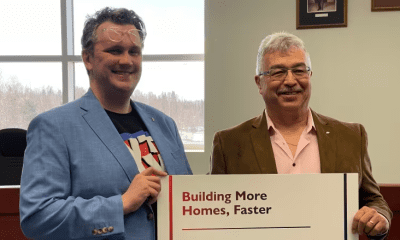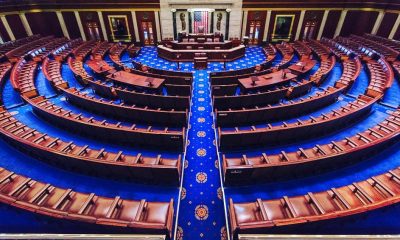Canada News
Liberals set table for health care negotiations with provinces, territories

Quebec Health Minister Gaetan Barrette (pictured) warned that any attempt to put conditions on how health-care dollars are spent could fuel the province’s sovereigntist movement. (Photo: Canada 2020/Flickr)
OTTAWA—The Trudeau Liberals are showing little sign of budging on their plan to clamp down on health-care transfer increases even as provincial finance ministers arrive in the capital to negotiate for more.
On Sunday morning, the federal Finance Department released figures showing that the Liberals are banking on a three per cent increase in health care funding, far below what provinces and territories are requesting.
In all, the numbers show the federal government intends to provide $37.15 billion next year to pay for health care in the provinces and territories, up from the almost $36.1 billion in transfers this year.
Ottawa has publicly said it intends to stick with just a three per cent annual increase as it heads into the meetings with provinces and territories Sunday night and Monday in Ottawa over the future of health funding.
But Quebec Health Minister Gaetan Barrette said Sunday that federal Finance Minister Bill Morneau has proposed a firm 3.5 per cent annual increase in transfers as well as another $8 billion over 10 years for areas such as home care and mental health. Ottawa is also talking about investing $1 billion into home-care infrastructure over four years, he said.
From the provinces’ point of view, however, Barrette insisted this offer would provide them with even less money over the next decade than what the Liberals pledged during their 2015 election campaign.
“Bill Morneau is playing with numbers, it’s a childish game,” Barrette said in an interview.
“Unless he proposes something better than what he put on the table, things are going to be very bad tomorrow.”
In their platform, the Liberals promised to allow the six per cent annual increase in transfers to fall to a floor of either three per cent or an average of nominal economic growth — whichever is higher. But nominal growth is projected to average above three per cent in the next few years.
The Liberal platform also pledged $3 billion over four years for home care.
The provinces and territories are set to turn up the pressure when they sit down to dinner Sunday with Morneau. Health ministers are scheduled to join the talks on Monday about long-term health funding.
On Friday, Morneau called provincial demands for bigger federal health funding transfers “out of the realm” of anything Ottawa would consider.
One proposal supported by at least several provinces has asked Ottawa to maintain the annual transfer increases at least as high 5.2 per cent, while another provincial pitch has called on the feds to ensure its share of provincial health-care budgets is pegged at 25 per cent.
But Morneau insisted the federal government wouldn’t agree to keep the annual increases in transfers above three per cent, nor would Ottawa raise its share of spending to 25 per cent of provincial health budgets.
Ottawa’s plan to allow annual health transfers to fall from six per cent to three per cent would trim nearly $1.1 billion this year from its combined payments to the provinces.
But that amount would compound quickly over the coming years.
The provinces say that would leave big holes in their health-care budgets.
Morneau does say the federal government would put a “significant” amount of money into specific areas such as home care and mental health over a period longer than five years.
Some provinces support a 10 year federal funding idea that would see health transfers increase by 5.2 per cent a year, while others want the federal government to gradually increase its share of provincial health-care budgets to 25 per cent.
The figures released by the federal government Sunday also show that funding for social programs will also go up by three per cent, the same annual increase seen over the last nine years. The transfer next year will be worth $13.75 billion, up $400 million from the $13.35 billion last year.
In all, the federal government is planning to provide provinces and territories with about $72.8 billion in transfer payments next year, including equalization payments to qualifying provinces.
Four provinces won’t qualify for equalization payments next year under the formula used to calculate the payments: Newfoundland and Labrador, Saskatchewan, Alberta and British Columbia. The remaining six provinces will combined receive $18.25 billion in equalization payments with Quebec receiving the largest share at $11 billion.
The constitutionally guaranteed equalization program redistributes money to poorer provinces, where the cash will help fund public services.





















